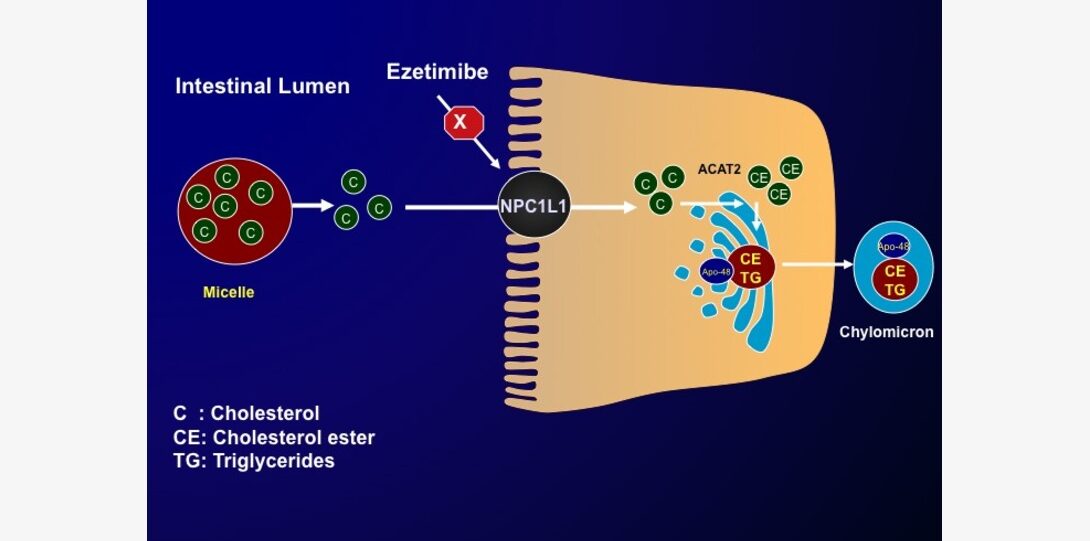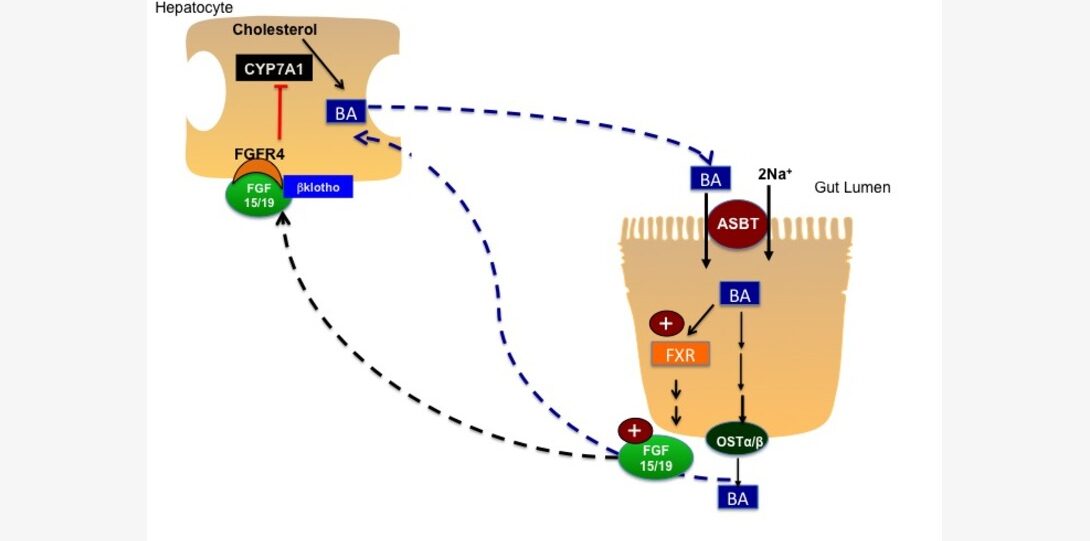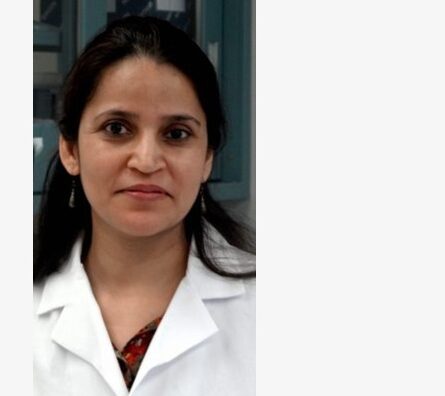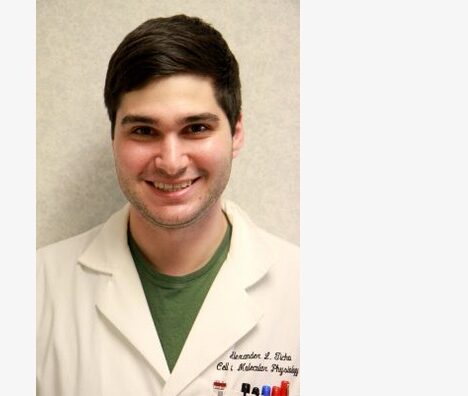Alrefai Lab
Research Interests: Bile Acid & Cholesterol Absorption Heading link
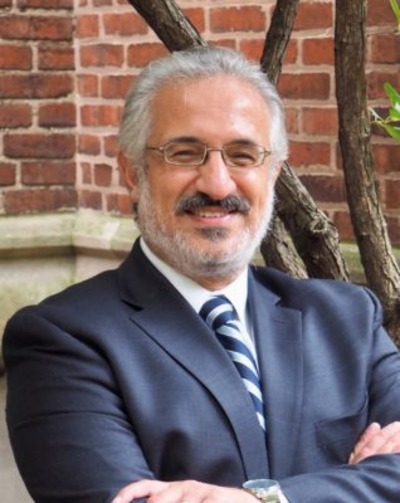
Alrefai Waddah
Professor of Medicine
Professor of Medicine
Bile acids and gut-liver axis
Bile acids are synthesized in the liver and secreted into the intestine where they play an essential role in lipid and cholesterol absorption. The majority of secreted bile acids are reabsorbed in the distal ileum and only about 5% enter the colon under normal conditions. The uptake of bile acids across the luminal membrane of enterocytes occurs via the Apical Sodium-Dependent Bile Acid Transporter (ASBT). The entry of bile acids into the enterocytes stimulates the expression and secretion of the gut-derived Fibroblast Growth Factor 19, FGF19 (FGF15 in rodents) that circulates to the liver where it suppresses the rate-limiting step of bile acid synthesis. Low levels of FGF19/15 result in overproduction of bile acids and an increase in their intestinal concentrations. Also, a decrease in ASBT function and expression leads to overproduction of bile acids and an increase in their intestinal luminal concentrations. In this regard, exposure of colon to high levels of bile acids stimulates electrolyte and water secretion and impairs epithelial barrier function leading to diarrhea. Our laboratory’s main focus is to investigate the cellular pathways involved in the modulation of these critical regulators of bile acid homeostasis, ileal ASBT and FGF19/15, and determine the contribution of their dysregulation to gut-related disorders such inflammatory bowel disorders and irritable bowel syndrome. Our studies also aim to understand the roles of disturbances in ileal ASBT and FGF19/15 in the development of liver diseases and metabolic disorders including diabetes mellitus.
Intestinal cholesterol absorptionHigh levels of plasma cholesterol represent a major risk factor for development of cholesterol-related disorders such as atherosclerosis and coronary heart disease. Intestinal cholesterol absorption has been shown to be a major determinant of plasma cholesterol levels. The Niemann Pick Type-C1 Like 1 (NPC1L1) has been identified as essential transport protein responsible for intestinal cholesterol absorption. NPC1L1 was also shown to be the molecular target of ezetimibe. Our studies seek to delineate the regulatory pathways involved in altering NPC1L1 expression under normal physiological conditions and in diseases associated with hypercholesterolemia such as diabetes mellitus. We are currently investigating the modulation of NPC1L1 protein level by proteosomal and lysosomal pathways. Also, our studies are centered on elucidating the epigenetic mechanisms involved in controlling NPC1L1 expression. The main objective of our investigations is to identify novel targets for therapeutic intervention for efficient reduction of cholesterol absorption and hypercholesterolemia.
Bile acids are synthesized in the liver and secreted into the intestine where they play an essential role in lipid and cholesterol absorption. The majority of secreted bile acids are reabsorbed in the distal ileum and only about 5% enter the colon under normal conditions. The uptake of bile acids across the luminal membrane of enterocytes occurs via the Apical Sodium-Dependent Bile Acid Transporter (ASBT). The entry of bile acids into the enterocytes stimulates the expression and secretion of the gut-derived Fibroblast Growth Factor 19, FGF19 (FGF15 in rodents) that circulates to the liver where it suppresses the rate-limiting step of bile acid synthesis. Low levels of FGF19/15 result in overproduction of bile acids and an increase in their intestinal concentrations. Also, a decrease in ASBT function and expression leads to overproduction of bile acids and an increase in their intestinal luminal concentrations. In this regard, exposure of colon to high levels of bile acids stimulates electrolyte and water secretion and impairs epithelial barrier function leading to diarrhea. Our laboratory’s main focus is to investigate the cellular pathways involved in the modulation of these critical regulators of bile acid homeostasis, ileal ASBT and FGF19/15, and determine the contribution of their dysregulation to gut-related disorders such inflammatory bowel disorders and irritable bowel syndrome. Our studies also aim to understand the roles of disturbances in ileal ASBT and FGF19/15 in the development of liver diseases and metabolic disorders including diabetes mellitus.
Intestinal cholesterol absorptionHigh levels of plasma cholesterol represent a major risk factor for development of cholesterol-related disorders such as atherosclerosis and coronary heart disease. Intestinal cholesterol absorption has been shown to be a major determinant of plasma cholesterol levels. The Niemann Pick Type-C1 Like 1 (NPC1L1) has been identified as essential transport protein responsible for intestinal cholesterol absorption. NPC1L1 was also shown to be the molecular target of ezetimibe. Our studies seek to delineate the regulatory pathways involved in altering NPC1L1 expression under normal physiological conditions and in diseases associated with hypercholesterolemia such as diabetes mellitus. We are currently investigating the modulation of NPC1L1 protein level by proteosomal and lysosomal pathways. Also, our studies are centered on elucidating the epigenetic mechanisms involved in controlling NPC1L1 expression. The main objective of our investigations is to identify novel targets for therapeutic intervention for efficient reduction of cholesterol absorption and hypercholesterolemia.
